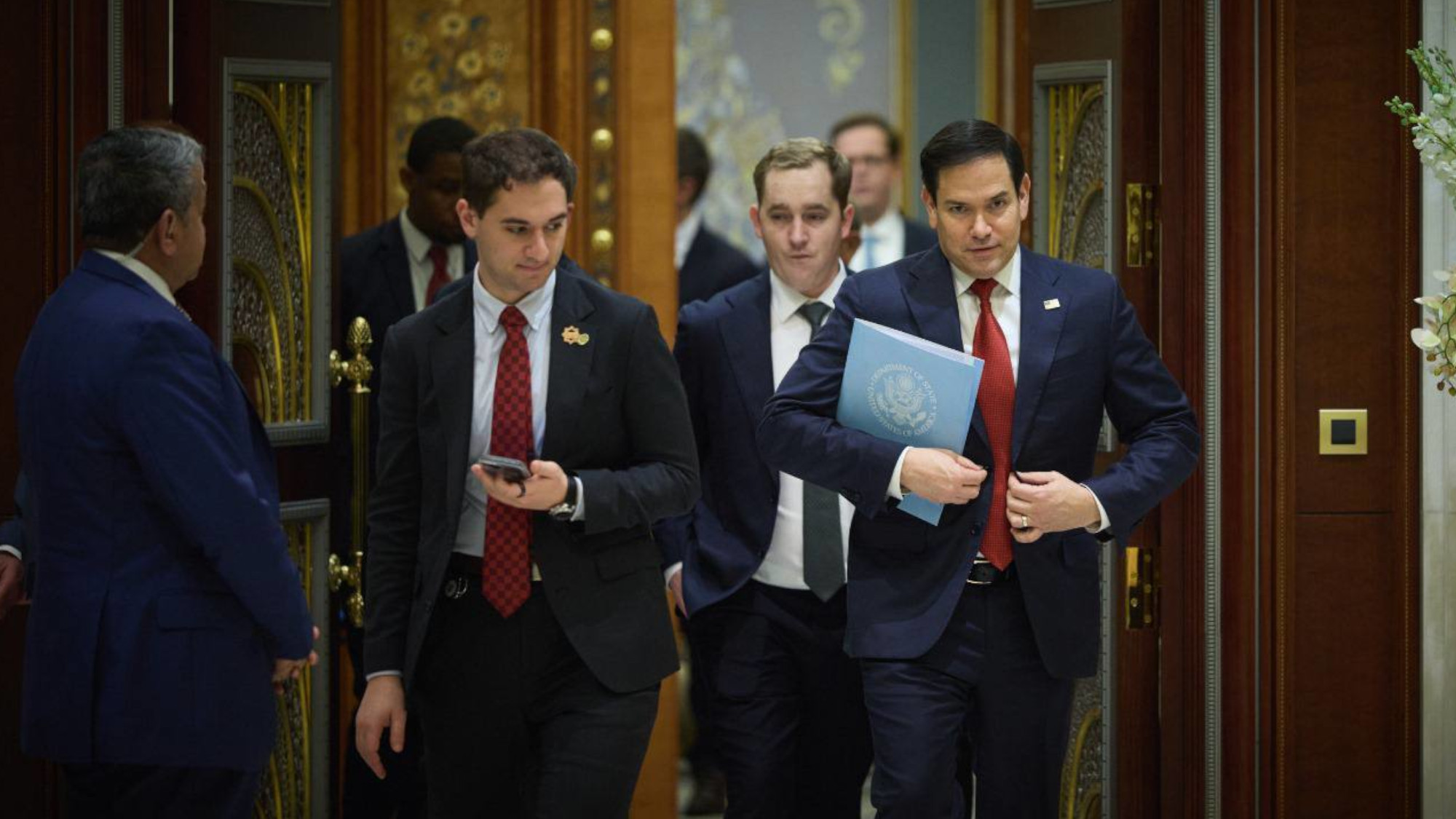U.S. aid resumes as Ukraine agrees to cease-fire
As Trump pressures Ukraine, NATO and European allies weigh new strategies

A free daily email with the biggest news stories of the day – and the best features from TheWeek.com
You are now subscribed
Your newsletter sign-up was successful
What happened
The Trump administration lifted its pause on intelligence sharing and military assistance for Ukraine after Ukraine agreed under pressure to a possible 30-day cease-fire with Russia. At negotiations in Saudi Arabia, the U.S. also said it would assist with humanitarian relief, while Ukraine agreed in principle to a deal to develop its mineral resources, with revenue going toward a reconstruction investment fund that the U.S. would partly own. Conceding territory to Russia — which Ukrainian President Volodymyr Zelensky had once vowed never to do — is on the table, Secretary of State Marco Rubio said. “That’s the only way this is going to end,” he said. “There’s no military solution.” He said it was now up to Russia, which was not at the talks, to accept the cease-fire.
Ukraine said the one-week pause in U.S. intel sharing had resulted in “hundreds of dead Ukrainians” because the country’s defenses were unable to stop a barrage of Russian missiles, but President Trump said Russian President Vladimir Putin was just “doing what anybody else would do” in pressing the advantage. Ukraine fired back this week, launching its largest drone attack on Moscow of the three-year war, killing three people. Meanwhile, at an unprecedented emergency summit in Paris, more than 30 army chiefs from NATO and EU countries as well as Japan and Australia met without the U.S. to discuss how to respond to the Trump administration’s growing rapprochement with Moscow. They proposed posting European troops at key infrastructure sites in Ukraine, with France and the U.K. offering up their own forces for deployment. “The political message is we can do it together, and without the United States,” said one European diplomat, “but it’s clear there are things we can’t do.”
What the editorials said
The cease-fire deal is “an offer Kyiv can’t refuse,” said The Wall Street Journal. Without U.S. assistance, Ukraine had been losing ground, particularly in Russia’s Kursk region. Yet even if Russia accepts, “this will not mean peace in our time.” Putin has broken multiple truces since he first invaded Crimea in 2014. He’d likely use any pause only “for a military respite and to rearm.”
The Week
Escape your echo chamber. Get the facts behind the news, plus analysis from multiple perspectives.

Sign up for The Week's Free Newsletters
From our morning news briefing to a weekly Good News Newsletter, get the best of The Week delivered directly to your inbox.
From our morning news briefing to a weekly Good News Newsletter, get the best of The Week delivered directly to your inbox.
We can only hope that “Ukraine will not be required to give up too much and Russia too little,” said The Dallas Morning News. Trump has demanded painful concessions from Zelensky but nothing from Putin. The only chance at lasting peace is for the U.S. to continue to back Ukraine with weapons and intelligence, and to fully support the presence of European peacekeeping troops as a “red line against Russian aggression.”
What the columnists said
Trump’s cease-fire proposal “just called Putin’s bluff,” said Matthew Chance in CNN.com. The Russians have been gloating about the apparent pro-Kremlin shift in American policy in recent weeks, especially after Trump kicked Zelensky out of the Oval Office last month. But “in exchange for all his courting, concessions, and praise, Trump may now expect Putin to play ball—or risk his wrath.”
That’s wishful thinking, said Trudy Rubin in The Philadelphia Inquirer. “Do not mistake” this cease-fire offer for progress toward peace. Trump has been steadily emboldening Putin—halting cyber operations against Russia, discussing the reopening of consulates— and all while cornering Ukraine into a “suicide deal” that would see it lose chunks of territory with no guarantee that Russia won’t invade again next year. Trump aides are reportedly looking to oust Zelensky, too, having made overtures to his political rivals. “Optimistically,” said Marc Champion in Bloomberg, that might be a smart strategy if Trump thinks Zelensky “just doesn’t get it” and is an obstacle to peace. But it looks like Trump is “deliberately ceding” Eastern Europe to Russia.
“Our policy toward Russia is all carrots and no sticks, and our policy toward Ukraine is all sticks and no carrots,” said Jim Geraghty in National Review. Here’s what Trump has given away so far: Ukraine can’t join NATO. The U.S. won’t send peacekeepers but will send home some 240,000 Ukrainian refugees. And the U.S. won’t seize Russia’s frozen assets or pursue its disinformation networks. If we were really serious about a lasting peace, we’d “arm the Ukrainians to the teeth and make eastern Ukraine look like the bloodiest quagmire for the Russians.” What’s on offer right now isn’t a cease-fire. It’s a “wholesale surrender” to Putin.
A free daily email with the biggest news stories of the day – and the best features from TheWeek.com
-
 Tourangelle-style pork with prunes recipe
Tourangelle-style pork with prunes recipeThe Week Recommends This traditional, rustic dish is a French classic
-
 The Epstein files: glimpses of a deeply disturbing world
The Epstein files: glimpses of a deeply disturbing worldIn the Spotlight Trove of released documents paint a picture of depravity and privilege in which men hold the cards, and women are powerless or peripheral
-
 Jeff Bezos: cutting the legs off The Washington Post
Jeff Bezos: cutting the legs off The Washington PostIn the Spotlight A stalwart of American journalism is a shadow of itself after swingeing cuts by its billionaire owner
-
 ‘Those rights don’t exist to protect criminals’
‘Those rights don’t exist to protect criminals’Instant Opinion Opinion, comment and editorials of the day
-
 ‘The mark’s significance is psychological, if that’
‘The mark’s significance is psychological, if that’Instant Opinion Opinion, comment and editorials of the day
-
 Democrats push for ICE accountability
Democrats push for ICE accountabilityFeature U.S. citizens shot and violently detained by immigration agents testify at Capitol Hill hearing
-
 Fulton County: A dress rehearsal for election theft?
Fulton County: A dress rehearsal for election theft?Feature Director of National Intelligence Tulsi Gabbard is Trump's de facto ‘voter fraud’ czar
-
 ‘Melania’: A film about nothing
‘Melania’: A film about nothingFeature Not telling all
-
 ‘The West needs people’
‘The West needs people’Instant Opinion Opinion, comment and editorials of the day
-
 ‘The censorious effect is the same, even if deployed covertly’
‘The censorious effect is the same, even if deployed covertly’Instant Opinion Opinion, comment and editorials of the day
-
 Vietnam’s ‘balancing act’ with the US, China and Europe
Vietnam’s ‘balancing act’ with the US, China and EuropeIn the Spotlight Despite decades of ‘steadily improving relations’, Hanoi is still ‘deeply suspicious’ of the US as it tries to ‘diversify’ its options